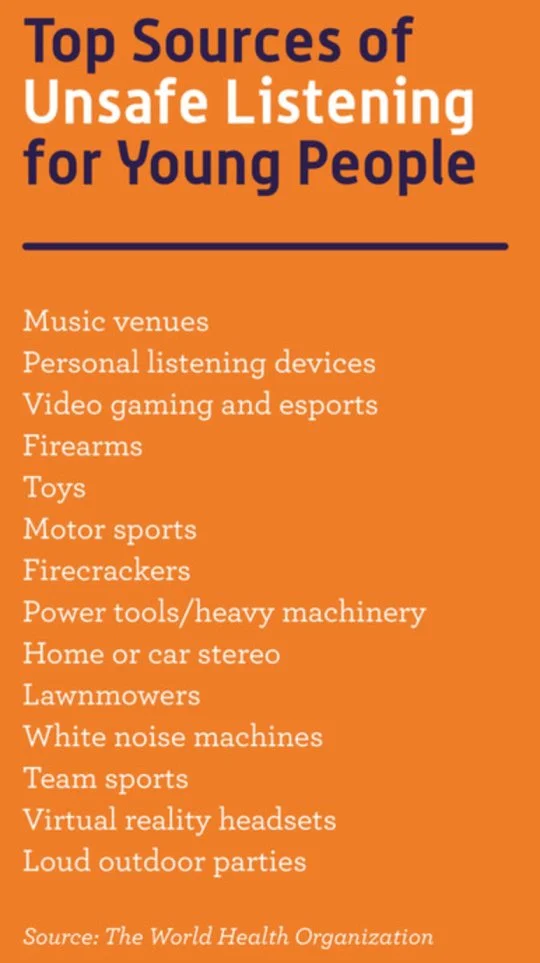By Michael Provost
(Desplácese hacia abajo para ver una traducción al español de este artículo.)
Michael Provost, just before he and his Riverine Troop departed on a nighttime mission on the Tigris River in Iraq in 2009.
I spent more than two decades in the U.S. Navy as a Special Warfare Combat Crewman (SWCC).
During that time, I was routinely exposed to loud diesel engine noise, explosive detonations, small arms fire, and crew-served automatic weapons fire. Like all SWCC, I sustained a volume of high G-force sub-concussive impacts attributed to driving high-speed combatant craft during foul weather conditions, often at night.
I first noticed high pitched ringing in my ears nearly a decade ago, in 2015, when I was 34.
Tinnitus is a mysterious condition. It’s difficult to explain my symptoms because only I can hear the high pitched ringing in my ears. It was a constant source of irritation and distraction, and I felt it contributed to feeling overstimulated.
The first doctor I spoke with about tinnitus explained to me there was nothing I could do and I just had to live with it. This was very disappointing because at that point my symptoms were at their peak.
In March 2022 I honorably retired from the U.S. Navy. I was 40 years old, with 21 ½ years of service. After I retired from the military I began working with a high-performance electric boat company, which was based in Sweden, so I was familiar with the Scandinavian approach to quality, design, research, sales and marketing. Through the Scandinavian professional network I had the unique opportunity to meet with a Duearity Sweden employee and see their tinnitus device in person.
When I learned of Duearity I was intrigued because up to that moment I was under the impression there was nothing I could do to treat my tinnitus symptoms. Duearity was founded by a tinnitus patient who invented a device, called Tinearity G1, that supplies white noise to the ear through bone conduction.
The G1 device and treatment protocol resonated with me on a personal level due to my struggles, but I also saw the potential benefit it could provide to the veteran community. Specifically, I was interested in bringing it to the awareness of Special Operations veterans given the predominance of tinnitus diagnosis within our community.
This photo shows live fire training on the Salt River in Kentucky in preparation for Provost’s Iraq deployment in 2006. Provost is manning the port (left) side twin M240 machine guns.
After additional research and discussions I made the decision to join the Duearity Americas team, where I eventually became president. On day one of employment, and under the guidance of an experienced audiologist, I began using Tinearity because I wanted to see for myself if it would reduce the severity of my symptoms.
It took dedication, time, and commitment to the treatment protocol, but I was able to reach a point where I no longer view my tinnitus symptoms as overly bothersome. I was very regimented and used the device for 100 consecutive days for four to six hours per day, as instructed. After about 100 days of regimented use I no longer felt like I needed to wear the device every day. After about 120 days of use I stopped using the device altogether.
I’ve reached the point where my brain and body no longer view the ringing in my ears as a threat and it resides in the background at a reduced volume and intensity.
I wish I would have known tinnitus habituation can be achievable. For me the G1 device combined with cognitive behavioral therapy was the catalyst for change. I’ve also benefited from white noise at night while sleeping.
That said, an audiologist trained in tinnitus treatment can provide tinnitus sufferers several different pathways and a menu of options for treatment. In my experience there is value in meeting with an audiologist or ENT who is specifically trained and familiar with tinnitus treatments.
I’ve recently left Duearity Americas and returned to the water. While I still act as a consultant for Duearity, I have decided to focus on my maritime training and services company Virginia Maritime Solutions. I’m also proud to continue to serve our nation as a government contracted Waterborne Security Boat Instructor teaching fleet sailors how to protect high valued assets.
To the younger military generation I would say wear your hearing protection, but understand there is only so much you can do. In wartime and during aggressive training things happen that will expose you to loud noise, and that’s just part of the job and your sacrifice to our country. And please, if you do have tinnitus symptoms seek help from an audiologist trained in tinnitus treatments.
Michael Provost lives in Virginia.
Products and services are not endorsed by Hearing Health Foundation.
Luchando Contra el Tinnitus Después de Casi 22 Años en la Marina
Por Michael Provost
Michael Provost, justo antes de que él y su Tropa Fluvial partieran en una misión nocturna en el río Tigris en Irak en 2009.
Pasé más de dos décadas en la Marina de los EE. UU. como tripulante de combate de guerra especial (SWCC por sus siglas en inglés).
Durante ese tiempo, estuve expuesto de manera rutinaria a ruidos fuertes de motores diésel, detonaciones de explosivos, fuego de armas pequeñas y de armas automáticas operadas por la tripulación. Como todos los SWCC, sufrí una gran cantidad de impactos subconmocionales de fuerza-G elevados, atribuidos a la conducción de naves de combate a alta velocidad en condiciones climáticas adversas, a menudo de noche.
Noté por primera vez un zumbido agudo en mis oídos hace casi una década, en el 2015, cuando tenía 34 años.
El tinnitus es una afección misteriosa. Es difícil explicar mis síntomas porque sólo yo puedo oír el zumbido agudo en mis oídos. Era una fuente constante de irritación y distracción, y sentía que contribuía a que me sintiera sobre estimulado.
El primer médico con el que hablé sobre el tinnitus me explicó que no podía hacer nada y que tenía que vivir con ello. Esto fue muy decepcionante porque en ese momento mis síntomas estaban en su punto máximo.
En marzo de 2022 me retiré honorablemente de la Marina de los EE. UU. Tenía 40 años y 21 ½ años de servicio. Después de retirarme del ejército, comencé a trabajar con una compañía de barcos eléctricos de alto rendimiento con sede en Suecia, por lo que me familiaricé con el enfoque escandinavo de calidad, diseño, investigación, ventas y marketing. A través de la red profesional escandinava, tuve la oportunidad única de reunirme con un empleado de Duearity Sweden y ver en persona su dispositivo para tinnitus.
Cuando me enteré de Duearity estuve intrigado porque hasta ese momento tenía la impresión de que no había nada que pudiera hacer para tratar mis síntomas de tinnitus. Duearity fue fundada por un paciente de tinnitus que inventó un dispositivo, llamado Tinearity G1, que suministra ruido blanco al oído a través de conducción ósea.
El dispositivo G1 y el protocolo de tratamiento me resonaron a nivel personal debido a mis dificultades, pero también vi el beneficio potencial que podría brindar a la comunidad de veteranos. En particular, me interesaba darlo a conocer a los veteranos de Operaciones Especiales, dada la prevalencia del diagnóstico de tinnitus en nuestra comunidad.
Después de más investigaciones y conversaciones, tomé la decisión de unirme al equipo de Duearity Americas, donde finalmente me convertí en presidente. El primer día de trabajo, y bajo la guía de un audiólogo experimentado, comencé a usar Tinearity porque quería ver por mí mismo si reduciría la gravedad de mis síntomas.
Esta foto muestra un entrenamiento con fuego en vivo, en el río Salt en Kentucky, en preparación para el despliegue de Provost en Irak en el 2006. Provost está manejando las ametralladoras gemelas M240 del lado de babor (izquierda).
Me llevó dedicación, tiempo y compromiso con el protocolo de tratamiento, pero pude llegar a un punto en el que ya no considero que mis síntomas de tinnitus sean demasiado molestos. Fui muy estricto y usé el dispositivo durante 100 días consecutivos y durante cuatro a seis horas por día, como me indicaron. Después de unos 100 días de uso estricto, ya no sentía que necesitaba usar el dispositivo todos los días. Después de unos 120 días de uso, dejé de usarlo por completo.
He llegado al punto en que mi cerebro y mi cuerpo ya no ven el zumbido en mis oídos como una amenaza, y reside en el fondo a un volumen e intensidad reducidos.
Ojalá hubiera sabido que era posible acostumbrarse al tinnitus. Para mí, el dispositivo G1 combinado con la terapia cognitiva conductual fue el catalizador del cambio. También me ha resultado beneficioso el ruido blanco por la noche mientras duermo.
Dicho esto, un audiólogo capacitado en el tratamiento del tinnitus puede ofrecer a quienes lo padecen varias vías diferentes y un menú de opciones de tratamiento. En mi experiencia, vale la pena reunirse con un audiólogo o un otorrinolaringólogo que esté específicamente capacitado y familiarizado con los tratamientos del tinnitus.
Recientemente dejé Duearity Americas y volví al agua. Si bien sigo trabajando como consultor para Duearity, decidí concentrarme en mi empresa de capacitación y servicios marítimos, Virginia Maritime Solutions. También estoy orgulloso de seguir sirviendo a nuestra nación como Instructor de Seguridad Marítima para Embarcaciones, contratado por el gobierno, enseñando a los marineros de la flota cómo proteger activos de alto valor.
A la generación militar más joven le diría que use protección auditiva, pero que comprenda que no puede hacer mucho más. En tiempos de guerra y durante un entrenamiento intensivo, ocurren cosas que lo exponen a ruidos fuertes, y eso es parte del trabajo y de su sacrificio por nuestro país. Y, por favor, si tiene síntomas de tinnitus, busque ayuda de un audiólogo capacitado en tratamientos para el tinnitus.
Michael Provost vive en Virginia.
Los productos y servicios no están respaldados por la Hearing Health Foundation.
Traducción al español realizada por Julio Flores-Alberca, setiembre 2024. Sepa más aquí y aquí.









As the first known Black author to publish a 10-book children’s series centered on deaf, hard of hearing, and disabled heroes, I’ve created what I once longed for: stories where children see themselves as powerful.